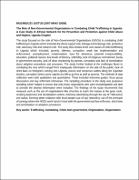| dc.description.abstract | MUSINGUZI JUSTUS (2007-M043-10006)
The Role of Non-Governmental Organisations in Combating Child Trafficking in Uganda: A Case Study of African Network for the Prevention and Protection against Child Abuse and Neglect, Uganda Chapter.
The study focused on the role of Non-Governmental Organisations (NGOs) in combating child trafficking in Uganda which included the direct support role, linkage and brokerage role, protective role, advocacy role and research role. The study also looked at the core causes of child trafficking in Uganda which included; poverty, idleness, corruption, weak law implementation and enforcement, unemployment, modernisation, love for adventure, parental irresponsibility, education, political reasons, low levels of literacy, infertility, lack of religious commitment, laxity in government security, lack of close monitoring by parents, corruption and lack of sensitisation about adoption procedures and processes. The study further looked at the challenges faced in combating the vice which ranged from inadequate information on the side of the public, lack of strict laws on foreigners coming into Uganda, porous and numerous outlets along the Ugandan borders, corruption where some culprits are left to go free as well as poverty. The methods of data collection were both qualitative and quantitative. These included interview guides, focus group discussions and key informant interviews. The sampling procedure in the study was purposive sampling which helped to ensure that only those respondents who were knowledgeable and able to provide the desired information were included. The findings of the study recommend that measures such as the use of organisations like churches to reach the masses at the grass roots, creating awareness and sensitisation centres, intensive advertising through the use of Televisions and radios, forming better relations with local people (use of spy networks), use of the principle of synergy where the NGOs work hand in hand with the government and law enforcers, strict laws and sensitisation on adoption procedures.
Key words: Trafficking, Combating, Child, Non-government, Organisation, Organization | en_US |


